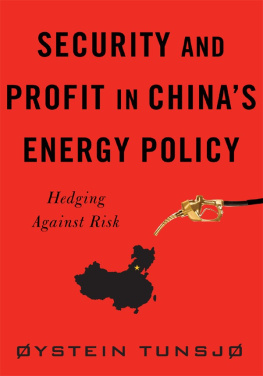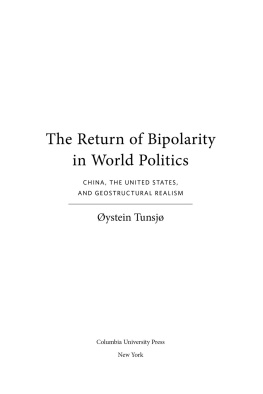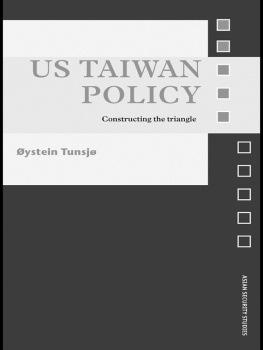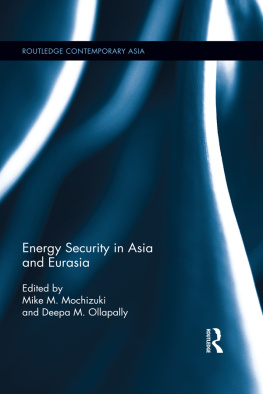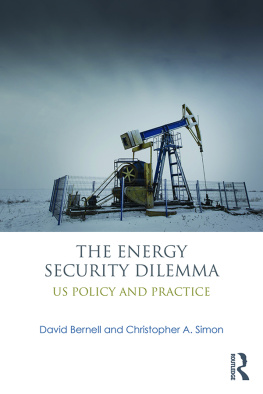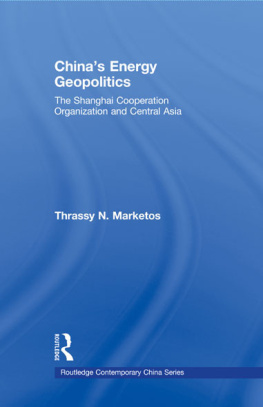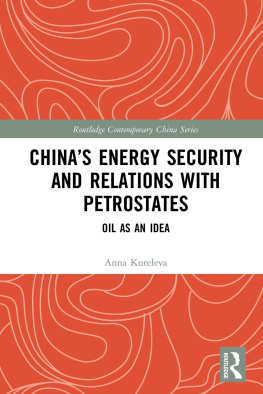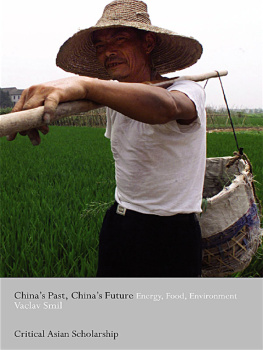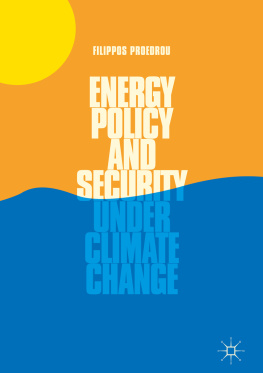SECURITY AND PROFIT IN CHINAS ENERGY POLICY
Contemporary Asia in the World
CONTEMPORARY ASIA IN THE WORLD
David C. Kang and Victor D. Cha, Editors
This series aims to address a gap in the public-policy and scholarly discussion of Asia. It seeks to promote books and studies that are on the cutting edge of their respective disciplines or in the promotion of multidisciplinary or interdisciplinary research but that are also accessible to a wider readership. The editors seek to showcase the best scholarly and public-policy arguments on Asia from any field, including politics, history, economics, and cultural studies.
Beyond the Final Score: The Politics of Sport in Asia, Victor D. Cha, 2008
The Power of the Internet in China: Citizen Activism Online, Guobin Yang, 2009
China and India: Prospects for Peace, Jonathan Holslag, 2010
India, Pakistan, and the Bomb: Debating Nuclear Stability in South Asia, umit Ganguly and S. Paul Kapur, 2010
Living with the Dragon: How the American Public Views the Rise of China, Benjamin I. Page and Tao Xie, 2010
East Asia Before the West: Five Centuries of Trade and Tribute, David C. Kang, 2010
Harmony and War: Confucian Culture and Chinese Power Politics, Yuan-Kang Wang, 2011
Strong Society, Smart State: The Rise of Public Opinion in Chinas Japan Policy, James Reilly, 2012
Asias Space Race: National Motivations, Regional Rivalries, and International Risks, James Clay Moltz, 2012
Never Forget National Humiliation: Historical Memory in Chinese Politics and Foreign Relations, Zheng Wang, 2012
Green Innovation in China: Chinas Wind Power Industry and the Global Transition to a Low-Carbon Economy, Joanna I. Lewis, 2013
The Great Kant Earthquake and the Chimera of National Reconstruction in Japan, J. Charles Schencking, 2013
Return of the Dragon: Rising China and Regional Security, Denny Roy, 2013
YSTEIN TUNSJ
SECURITY AND PROFIT IN CHINAS ENERGY POLICY
Hedging Against Risk
Columbia University Press / New York
Columbia University Press
Publishers Since 1893
New York Chichester, West Sussex
cup.columbia.edu
Copyright 2013 Columbia University Press
All rights reserved
E-ISBN 978-0-231-53543-4
Library of Congress Cataloging-in-Publication Data
Tunsj, ystein.
Security and profit in Chinas energy policy : hedging against risk/Oystein Tunsjo.
pages cm.(Contemporary Asia in the world)
Includes bibliographical references and index.
ISBN 978-0-231-16508-2 (cloth : alk. paper)ISBN 978-0-231-53543-4 (e-book)
1. Energy policyChina. 2. Energy securityChina. 3. Energy resources developmentChina. I. Title.
HD9502.C62T86 2013
333.790951dc23
2013006636
A Columbia University Press E-book.
CUP would be pleased to hear about your reading experience with this e-book at .
JACKET DESIGN: Thomas Stvan
References to websites (URLs) were accurate at the time of writing. Neither the author nor Columbia University Press is responsible for URLs that may have expired or changed since the manuscript was prepared.
To my father
CONTENTS
In writing this book I have had the advice and assistance of many individuals. I benefited greatly from my interviews with experts and analysts in the petroleum industry, the shipping sector, and commodity research in China, the United States, and Norway.
Academics following Chinese energy security policy and international relations scholars have been generous with their time and helpful in passing on suggestions and comments. In China, I am indebted to Wang Haibin, Zhao Hongtu, Zhang Tuosheng, Zha Daojiong, Xue Li, Wang Yizhou, Wu Baiyi, Lu Dehong, Ouyang Wei, Xu Weidi, Kate Westgarth, and Linda Jakobson. I also gained valuable experience and contacts when I participated in co-organizing with the China Foundation for International and Security Studies and the Chinese Academy of Social Sciences the Energy Security in Asia conference in Beijing in May 2009, which brought together leading Chinese and international energy experts. In the United States, I am grateful to Bud Cole, Mikkal Herberg, Edward Chow, Bo Kong, David Pumphrey, Daniel Rosen, Gabriel Collins, Andrew Erickson, Peter Dutton, Chin-hao Huang, and Edward Steinfeld. In Norway, I want to thank Jo Inge Bekkevold, Dag Harald Claes, Stein Tnnesson, Ingerid Opdahl, Tor Vidar Mykland, and Jonas Grtz. In Japan, I am grateful to Tatsuo Masuda and Yoji Koda.
I am especially indebted to the following for providing invaluable feedback throughout the book project:
To Robert S. Ross, for providing constructive criticism on my work and for guiding me in my academic career. To be a recipient of Bobs knowledge, collegiality, and friendship have been a privilege.
To Erica Downs, for many stimulating discussions, for reading part of the manuscript, and for encouraging me to develop the hedging framework.
To Johannes R, for always finding time to discuss and read my work and for pushing my thinking on hedging beyond what I could have achieved alone.
While writing the book manuscript, I had the support of Nancy Hearst, who proofread the entire manuscript and made valuable suggestions. Jan Blstad at the Norwegian Military Geographic Service was very helpful in creating maps. I want to thank my editor Anne Routon at Columbia University Press, whose interest in this project has been most helpful.
The Norwegian Embassy in Beijing, the Norwegian Embassy in Tokyo, the Norwegian Embassy in Washington, D.C., the Norwegian Ministry of Petroleum and Energy, and the Norwegian Ministry of Foreign Affairs have all been forthcoming and helpful during my research. In particular, I would like to thank the Norwegian Ministry of Defense for generously providing economic funding for this research. I also benefited from a Fulbright scholarship that allowed me to stay as a visiting scholar at the Fairbank Center for China Studies at Harvard University in 2010. I am grateful to my colleagues at the Norwegian Institute for Defense Studies (IFS) and, in particular, Director Sven Holtsmark and former Director Rolf Tamnes, for providing an excellent environment that allows research to thrive and academic ambitions to prosper. Needless to say, the shortcomings of this book are my own.
My biggest debt is to my family and my wife, Hege. Without Heges love, continuing support, and understanding, this book would never been completed. Axel and Felix have reminded me of the critical balance between academic life and the other rewards that life has to offer. I have dedicated this book to my father, Jack Tunsj, to whom I owe more than I can ever repay.
| APEC | Asia Pacific Economic Cooperation |
| ARF | Association of Southeast Asian Nations Regional Forum |
| ASCM | antiship cruise missile |
| ASEAN | Association of Southeast Asian Nations |
| ASC | antiship capability |
| ASW | antisubmarine weapon |
| AU | African Union |
| bpd | barrels per day |
| CSCAP | Council on Security Cooperation in the Asian Pacific Region |
| CASS | Chinese Academy of Social Sciences |
| CBM | coal-bed methane |
| CCP | Chinese Communist Party |

